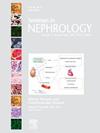Core Patient-Reported Outcomes for Trials in Nephrology
IF 3.5
3区 医学
Q2 UROLOGY & NEPHROLOGY
引用次数: 0
Abstract
The outcomes reported in trials across all stages of chronic kidney disease (CKD) are highly variable and often do not include outcomes that are directly relevant to patients and caregivers. Frequently, the outcomes reported in trials are often unvalidated surrogate biochemical end points. The omission of outcomes that are meaningful and important to patients can diminish the value of trials in supporting treatment decisions. In response, there have been increasing efforts across many health and medical disciplines to develop core outcome sets, defined as the minimum set of outcomes to be reported in all trials in a specific health area to improve the relevance and consistency of reporting trial outcomes. The international Standardized Outcomes in Nephrology (SONG) initiative was established in 2014 and has since developed seven core outcome sets for different diagnosis and treatment stages of CKD. The core outcomes were based on consensus among patients, caregivers, and health professionals. Each core outcome set includes at least one patient-reported outcome, including fatigue (hemodialysis), life participation (kidney transplantation, peritoneal dialysis, early CKD not yet requiring kidney replacement therapy, children and adolescents, and glomerular disease), and pain (polycystic kidney disease). This article outlines how patient-reported outcomes are currently reported in trials, discusses core patient-reported outcomes that have been established for trials in kidney disease, and outlines strategies for implementing core patient-reported outcomes in trials.
肾内科试验的核心患者报告结果。
慢性肾脏病(CKD)各个阶段的试验报告结果差异很大,而且往往不包括与患者和护理人员直接相关的结果。试验报告的结果往往是未经验证的代用生化终点。忽略对患者有意义和重要的结果会降低试验在支持治疗决策方面的价值。为此,许多健康和医学学科都在不断努力开发核心结果集,将其定义为特定健康领域所有试验报告的最低结果集,以提高试验结果报告的相关性和一致性。国际肾脏病标准化结果(SONG)倡议成立于 2014 年,至今已针对慢性肾脏病的不同诊断和治疗阶段制定了七套核心结果。这些核心结果基于患者、护理人员和医疗专业人员的共识。每套核心结果至少包括一项患者报告的结果,包括疲劳(血液透析)、生活参与(肾移植、腹膜透析、尚未需要肾脏替代治疗的早期 CKD、儿童和青少年以及肾小球疾病)和疼痛(多囊肾)。本文概述了目前在试验中报告患者报告结果的方式,讨论了肾脏病试验中已确立的核心患者报告结果,并概述了在试验中实施核心患者报告结果的策略。
本文章由计算机程序翻译,如有差异,请以英文原文为准。
求助全文
约1分钟内获得全文
求助全文
来源期刊

Seminars in nephrology
医学-泌尿学与肾脏学
CiteScore
5.60
自引率
0.00%
发文量
27
审稿时长
6-12 weeks
期刊介绍:
Seminars in Nephrology is a timely source for the publication of new concepts and research findings relevant to the clinical practice of nephrology. Each issue is an organized compendium of practical information that serves as a lasting reference for nephrologists, internists and physicians in training.
 求助内容:
求助内容: 应助结果提醒方式:
应助结果提醒方式:


